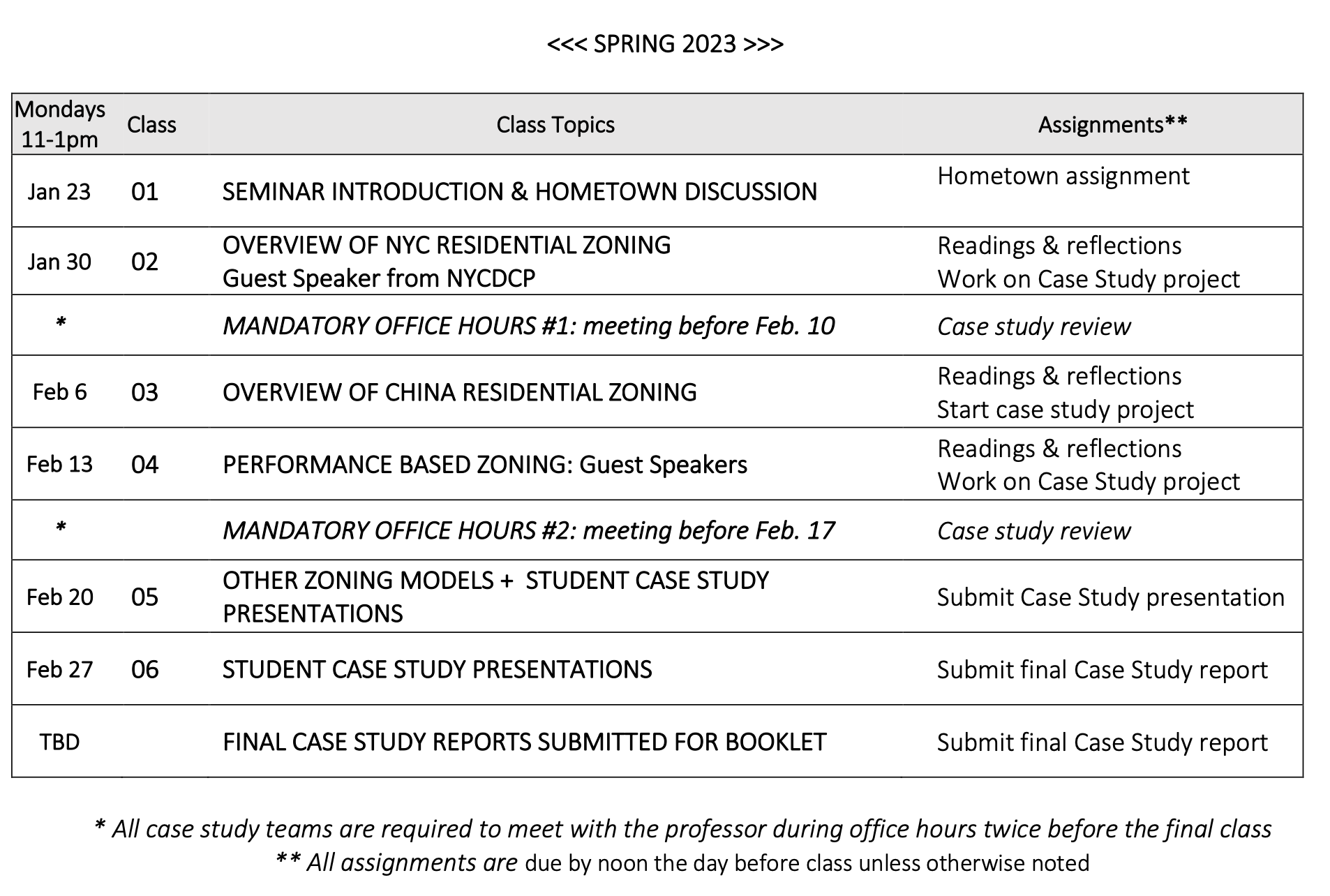
RESIDENTIAL PLANNING IN GLOBAL CITIES
INSTRUCTOR: KATE DUNHAM
As the world’s urban population grows towards six and a half billion by 2050, cities all over the world are resorting to the mass-production of residential super-blocks to address new urban housing demands. But is this model appropriate for all cities, regardless of their environmental, social, political and economic differences? This seminar will provide students with a hands-on opportunity to understand how planning code regulations - specifically residential codes - can shape the design and functioning of future neighborhoods in our rapidly urbanizing age. In this course students will explore case studies from around the world, learn about different planning models and have a chance to develop their own ideas of how to use zoning as a tool to better address challenges facing cities today. This seminar offers a multi-disciplinary approach to thinking about zoning and gives students from different related fields, such as planning, urban design, architecture and real estate, an opportunity to work collaboratively.
|
COURSE ORGANIZATION & ASSIGNMENTS
In this seminar students will be regularly reading, researching, and presenting their own ideas to the class both in teams and individually. With the readings, students will be asked to submit short reading reflections (three or more comments or questions) in advance of class to inspire class discussion. There will be one team project to document an existing notable zoning system from a selected residential neighborhood. Case studies in the past have been selected from neighborhoods in Hong Kong, Tokyo, Taipei, Shanghai, Mumbai, Amsterdam, Paris, Freiburg, Stockholm, Vancouver, New York, Portland, Miami, Bogota, and Rio de Janeiro. Students will be expected to do the readings, attend all the classes and to participate actively in class discussions.
COURSE GRADING
60% Team case study report
25% Reading reflections
15% Class participation
*** SCHEDULE 2023 ***

*** SYLLABUS 2023 ***
Make sure to check the Assignments folder in CourseWorks to get the most up-to-date assignment instructions
|
Jan 23
|
01
|
COURSE INTRODUCTION & HOMETOWN DISCUSSION
|
|
|
|
ASSIGNMENT FOR CLASS 1: Hometown Introduction presentation
Submit one ppt slide of your hometown neighborhood to be shared in class as part of your personal introduction. Please use the powerpoint “HOMETOWN - template” provided in the CourseWorks/Files/ assignment_01 folder. Email the instructor if you have any questions.
|
|
Jan 30
|
02
|
OVERVIEW OF NYC RESIDENTIAL ZONING (Guest Lecturer: from NYCDCP)
|
|
|
|
ASSIGNMENT FOR CLASS 2:
1] Readings & Reflections
- Talen, Emily: City Rules. Chapters 2-5.
- C.U.P. : What is Zoning guidebook. Skim the book for a quick overview of NYC zoning.
- NYCDCP Zoning Handbook 2006 Chapters 1- 4
- Familiarize yourself with the New York City Department of City Planning About Zoning website including the City Planning History
2] Start work on your team Case Study (see assignment for CLASS 5)
|
|
Feb 6
|
03
|
OVERVIEW OF CHINA RESIDENTIAL ZONING
|
|
|
ASSIGNMENT FOR CLASS 3:
1] Readings & Reflections
- den Hartog: Shanghai New Towns, pp. 305-320 Fujita on “danweis”.
- den Hartog: Shanghai New Towns, pp. 369-392 den Hartog on Community Identity.
- Lu, Rowe, Jie: Modern Urban Housing in China, Conclusion pp. 283-296.
- World Bank: Urban China. pp. 43-48 Optimizing Urban Land Use
- Xue: Building Practice in China, Chapter 4 Planning Procedure.
- Xue: Building Practice in China, Chapter 8 Regulations.
2] Work on your team Case Study (see assignment for CLASS 5)
3] Required Office Hours: meet with the professor before next class to review expectations for your case study.
|
|
Feb 13
|
04
|
PERFORMANCE BASED ZONING: Guest Speakers TBD
|
|
|
|
ASSIGNMENT FOR CLASS 4:
1] Readings & Reflections (TBD)
2] Work on your team Case Study
3] Required Office Hours: meet with the professor before next class to review progress on your case study.
|
|
Feb 20
|
05
|
OTHER ZONING MODELS + STUDENT PRESENTATIONS OF ZONING CASE STUDIES
|
|
|
|
ASSIGNMENT FOR CLASS 5 and 6:
ASSIGNMENT FOR CLASS 5 (last class):
Prepare brief ppt presentation of your CASE STUDY (max. 10 min.)
|
|
Feb 27
|
06
|
STUDENT PRESENTATIONS OF ZONING CASE STUDIES
|
|
|
|
ASSIGNMENT FOR CLASS 5 and 6:
ASSIGNMENT FOR CLASS 5 (last class):
Prepare brief ppt presentation of your CASE STUDY (max. 10 min.)
|
|
TBD
|
07
|
SUBMIT FINAL REPORT - ZONING CASE STUDIES (no class time)
|
|
|
|
ASSIGNMENT 7 (due after the last class):
Complete and submit the FINAL REPORT for your CASE STUDY to be included in the class book
|
*** ASSIGNMENT INSTRUCTIONS ***
Make sure to go to the Courseworks/ASSIGNMENTS to get the most up-to-date instructions. (This syllabus is only a general outline of the lectures and assignments).
Readings & Reflections:
- Do all the required readings and if time allows take a look at the optional readings. All readings are provided in the assignment folders in Courseworks/FILES.
- Reflect on the required readings and write at least three comments or questions you have based on the readings to contribute to class discussion.
- Submit your reflections on-line through CourseWorks
Project Presentations (to be done in teams):
- Use the required project templates which will be provided inCourseworks/FILES
Submission requirements for all assignments (including reading reflections and project reports):
- Include your name and date at the top of your assignment submission.
- Submit all your assignments to courseworks the day before class.
- Use this standard file naming format for on-line submissions:
Submission date (year-month-day) Last name First name.pdf
(For example: 2023-01-01 Dunham Kate.pdf)
|
The syllabus page shows a table-oriented view of the course schedule, and the basics of
course grading. You can add any other comments, notes, or thoughts you have about the course
structure, course policies or anything else.
To add some comments, click the "Edit" link at the top.
Course Summary: